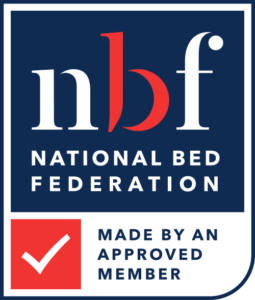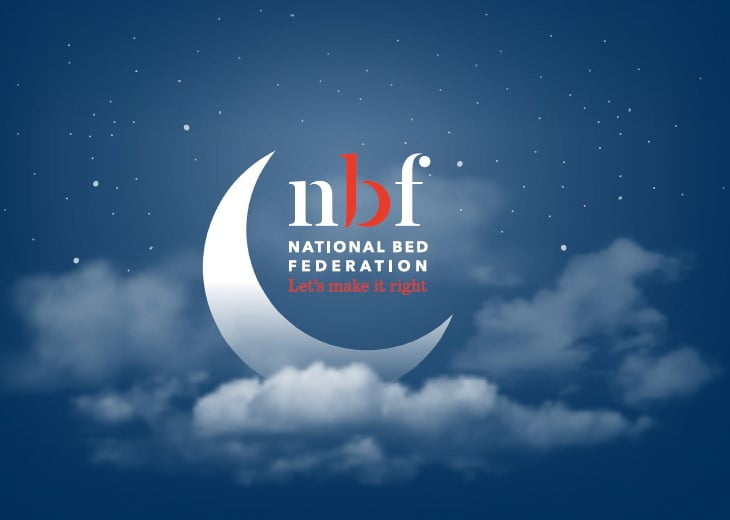Code of Practice
What the NBF Code of Practice means for you
Now there’s a way to be completely assured that the beds you and your customers buy are everything they say they are. That’s to buy from a National Bed Federation Approved Member.
Every NBF-approved member manufacturer (and quite a few component suppliers too) has been audited by SATRA against NBF’s strict Code of Practice, which sets out criteria for ensuring processes and procedures are in place for supply chain scrutiny and compliance with regulatory compliance.
Our video explains what the NBF Code of Practice means for UK bed retailers.
NBF Code of Practice FAQs
What exactly are the NBF Code of Practice’s criteria?
The NBF Code of Practice Version 5/2023 covers 10 key areas of business:
- Flammability
- Cleanliness & Re-use
- Trade descriptions
- Labelling & composition of textile products
- Timber legislation (UK & EU)
- Chemical legislation (UK & EU, REACH, POPs, Biocides)
- Evidence of Health & Safety compliance
- Evidence of Process Controls / Procedures
- Evidence of Product Safety Management
– Evidence of PAS 7100 – Corrective actions – Product Safety Incident Plan (PSIP)
– Awareness of PA 7050 – Bringing safe products to market – Product Safety Management Plan (PSMP) - Evidence of reporting under Modern Slavery Act 2015 (where obligated)
What’s the point? Aren’t the NBF just wasting their time, putting all this effort into checking if companies are complying with the law, when that’s what they should be doing anyway?
We’re not saying that only NBF members are reputable, of course. But we’ve got to start somewhere and that means putting our own house in order first. Our members want this. They want to say loud and clear to their customers, “we do it how it should be done.”
Basically, we want the trade and the public to know that, if they buy a product from an NBF member they can buy with confidence, knowing that safety standards are being met and that they are buying what it says it is!
What does the NBF Code of Practice mean to retailers?
Essentially, we’re taking the hard work out of responsible sourcing for retailers. Honest trading has become a hot issue and the media is constantly highlighting transgressions (the horsemeat scandal being the most high profile).
As a result, third party auditing is becoming more and more commonplace, particularly by larger retailers, who are more on the front line when it comes to media attention and consumer awareness. Smaller retailers don’t have those resources and have to take what they’re told by companies on trust. Sadly, that trust is not always respected.
Retailers should also remember that they are equally responsible for ensuring the products they source comply with the required laws. Ignorance isn’t an excuse and it is YOUR business, along with the supplier’s, which could face court action and financial penalties (or worse) and the consequential loss of face and long term business damage.
How vigorous are the auditing checks?
Judging from the feedback from our members– they are pretty vigorous!
We work with SATRA, – so while the NBF has set the parameters of the audit, SATRA determines if those parameters are being met to a satisfactory level and sets appropriate methods and timescales for coming up to scratch if need be.
Some companies may need to make minor adjustments or corrections; others might need to take more drastic remedial action to meet the criteria.
We’re not out to catch members out and punish them; we’ve put the system in to encourage best practices and help members achieve acceptable standards.
However if a member is unable or unwilling to meet the required standards within a reasonable time frame, then they will no longer be able to remain an NBF member.
How often are audits repeated to ensure members remain compliant?
The frequency of auditing is in part determined by the auditors – some companies will be visited more often if it is felt they need more support to fully meet the criteria on an ongoing basis. Ultimately we aim to be auditing members at least every three years.
What happens if an NBF Member fails an audit?
Will new members have to be audited before they can join?
Yes – all companies wishing to join the NBF will need to be audited and meet the code’s criteria before their application will be considered.
How is the scheme publicised?
NBF members use the ‘Made by an Approved Member’ logo on product labels and a wide range of marketing materials. The NBF uses both PR and advertising to raise awareness of the Mark and what it stands for.
Does the Code actually clamp down on less scrupulous traders?
The NBF works proactively with trading standards to identify and put a stop to those in our trade who deliberately flout product regulations which are there to protect the consumer.
So, if you come across some dodgy practices or have your doubts about whether a product meets UK requirements for fire resistance, cleanliness, trade descriptions or you have any other concerns, please contact us!
Further Reading
NBF Code of Practice Summary
View a PDF summary of the main points of the NBF Code of Practice.
Due Diligence Testing Programme
Developed by the NBF to strengthen its Code of Practice.
BFC Contract Flammability Guide
BFC Domestic Flammability Guide
NBF Code of Practice Resources
This content is only available to employees of NBF member companies.
Members have access to helpful information on key areas such as Market Intelligence & Reports, Regulations & Standards, Trade Name Register and details of the NBF Code of Practice and our Due Diligence testing Programme.
Please note, access is not available for non-members.

Join the NBF
Be part of our award-winning trade association for the UK & Ireland's bed industry








